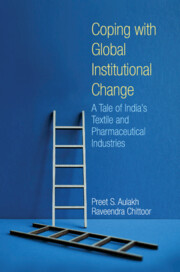Book contents
- Frontmatter
- Dedication
- Contents
- List of Figures
- List of Tables
- List of Appendices
- Preface
- 1 Introduction: The Challenge of Global Institutional Change
- 2 Conceptual Foundations and an Organising Framework
- 3 National Policy Choices
- 4 Industry Evolution: Tale of Two Industries
- 5 Strategic Renewal and Firm-Level Responses
- 6 Conclusion: Implications for Theory and Policy
- Bibliography
- Index
1 - Introduction: The Challenge of Global Institutional Change
Published online by Cambridge University Press: 11 June 2022
- Frontmatter
- Dedication
- Contents
- List of Figures
- List of Tables
- List of Appendices
- Preface
- 1 Introduction: The Challenge of Global Institutional Change
- 2 Conceptual Foundations and an Organising Framework
- 3 National Policy Choices
- 4 Industry Evolution: Tale of Two Industries
- 5 Strategic Renewal and Firm-Level Responses
- 6 Conclusion: Implications for Theory and Policy
- Bibliography
- Index
Summary
What will happen to textile industries in … more than 40 … countries with thriving clothing industries based on exports. They are bracing for the scheduled elimination … of quotas that have governed their exports to the world's two biggest markets: America and the European Union. The quotas have restrained some countries’ exports, but in others, they have created an export industry that might not otherwise have existed.
—‘The Looming Revolution: The Textile Industry’, The Economist, 13 November 2004, 76India has become the world's supplier of cheap … drugs because it has the necessary raw materials and a thriving and sophisticated copycat drug industry made possible by laws that grant patents to the process of making medicines, rather than to the drugs themselves. However, when India signed the World Trade Organization's agreement on intellectual property in 1994, it was required to institute patents on products by Jan. 1, 2005. These rules have little to do with free trade and more to do with the lobbying power of the American and European pharmaceutical industries.
—‘Editorial: India's Choice’, New York Times, 18 January 2005, A20First January 2005 is an important date in the history of the governance of international trade. It is on this day that two global institutional changes took effect that, taken together, altered the trajectory of trade flows in textiles and pharmaceuticals, two industries that play salient roles in different ways in the economies of a large number of developing and developed countries. Negotiated as a part of the General Agreement on Tariffs and Trade’s, or GATT’s, Uruguay Round of talks during the 1986–1994 period, member countries agreed to adopt the Textiles and Clothing (ATC) and Trade Related Intellectual Property Rights (TRIPS) agreements on 1 January 1995, which were to be phased in over the next ten years. The Agreement on Textiles and Clothing abolished the Multi- Fibre Agreement (MFA), which had governed global trade in textiles since 1974. The MFA endorsed bilaterally negotiated agreements on import quotas by developed countries on the exports of textile products from developing countries. Under the new arrangement after 2005, global trade in textiles and clothing would no longer be subject to protectionist quotas but would be governed by the general rules and disciplines embodied in the multilateral trading system.
Information
- Type
- Chapter
- Information
- Coping with Global Institutional ChangeA Tale of India's Textile and Pharmaceutical Industries, pp. 1 - 15Publisher: Cambridge University PressPrint publication year: 2022
